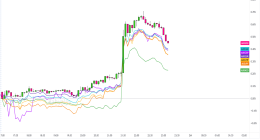Chinese phone makers have yet to make significant in-roads in the US market, but that doesn’t seem to bother them much — they’re too busy focusing on Europe instead.
The latest example of this shift in attention is Xiaomi’s announcement that it plans to triple its European store count by the end of the year. CNBC reports that the firm wants to go from fewer than 50 stores at the end of 2018 to more than 150 by the end of the 2019. “It’s a big big target for us,” Xiaomi’s senior vice president, Wang Xiang, said.
It’s also part of an established trend. Chinese brands like Xiaomi, Huawei, Oppo, Vivo, and OnePlus are grabbing more and more of the European market. In the last quarter of 2018, market analysts Canalys reported that they accounted for a third (32 percent) of all smartphone shipments in Europe, with Huawei taking the majority of that slice (23 percent).
:no_upscale()/cdn.vox-cdn.com/uploads/chorus_asset/file/13758639/1.jpeg)
There are a number of reasons for this shift. One is the mobile ecosystem in the US, which relies heavily on distribution via carriers. This can be tough for outside companies to crack. Another is the hostility of US intelligence agencies towards Chinese tech firms. Huawei and ZTE in particular have been singled out as threats, with the heads of the FBI, CIA, and NSA going so far as to directly warn consumers against buying Huawei handsets. This had led to scrapped deals with US carriers and, most likely, consumer distrust.
But by focusing on Europe, Chinese firms are growing their global market share. As CNBC noted, Xiaomi and Huawei’s European shipments increased 62 percent and 52 percent respectively in the most recent quarter, while Apple’s and Samsung’s shipments both fell in that same period.
Chinese phone makers used to be best know for producing high-spec, low-cost devices (and they still do quite a bit of that). But in recent years they’ve also shown they can out-innovate more established companies, getting new features like bezel-less displays and multi-lens cameras to marker quicker than rivals. The only question is, how much longer will US consumers be content to be missing out?
This article is from The Verge









